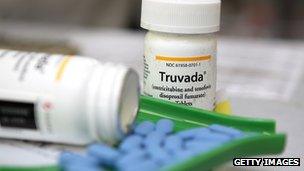HIV prevention pill Truvada backed by US experts
- Published
Dr Robert Grant, from Gladstone Institutes: ''I think this is a huge milestone, I think we are in a era where we can see the end of the Aids epidemic''
A panel of US health experts has for the first time backed a drug to prevent HIV infection in healthy people.
The panel recommended US regulators approve the daily pill, Truvada, for use by people considered at high risk of contracting the Aids virus.
The US Food and Drug Administration (FDA) is not required to follow the panel's advice, but it usually does.
Some health workers and groups active in the HIV community have opposed the approval of the drug.
However, correspondents say the move could prove to be a new milestone in the fight against HIV/Aids.
Truvada is already approved by the FDA for people who are HIV-positive, and is taken along with existing anti-retroviral drugs.
Studies from 2010 showed that Truvada, made by California-based Gilead Sciences, reduced the risk of HIV in healthy gay men - and among HIV-negative heterosexual partners of people who are HIV-positive - by between 44% and 73%.
June decision
The Antiviral Drugs Advisory Committee, which advises the FDA, voted 19-3 in favour of prescribing the drug to the highest risk group - non-infected men who have sex with multiple male partners.
They also approved it, by majority votes, for uninfected people with HIV-positive partners and for other groups considered at risk of acquiring HIV through sexual activity.

Truvada has been used as a treatment for people infected with HIV in the US since 2004
The votes followed an 11-hour meeting of the panel in Silver Spring, Maryland, and a lengthy public comments session.
Opposition to the prospect of approving the drug is based on concerns that users could gain a false sense of security, and fears of a drug-resistant strain of HIV.
There is also concern that the high cost of Truvada could divert limited funding from more cost-effective options.
"We need to slow down. I care too much about my community not to speak my concerns," said Joey Terrill, of the Aids Healthcare Foundation, which campaigned against the drug's approval.
Nurse Karen Haughey told the panel: "Truvada needs to be taken every day, 100% of the time, and my experience as a registered nurse tells me that won't happen.
"In my eight years, not one patient that I've cared for has been 100% adherent."
But others welcomed the panel's recommendation.
"This brings us closer to a watershed for global HIV prevention efforts," said Mitchell Warren, executive director of the Aids Vaccine Advocacy Coalition, after the vote.
The FDA is expected to make its decision by 15 June.
In the UK, Sir Nick Partridge, chief executive of Terrence Higgins Trust, said: "There is no single method of prevention that can on its own stop the transmission of HIV.
"Adding Truvada to our existing range of prevention programmes, including safer sex campaigns, using condoms and regular testing for HIV is an exciting prospect.
"But we need to know if people at highest risk of infection are prepared to take a pill every day and whether there would be an increase in risk-taking behaviour which could outweigh the prevention effectiveness of Truvada."
He said a clinical trial to invesitgate these issues would begin in the UK in the autumn.
- Published12 May 2011
- Published23 November 2010